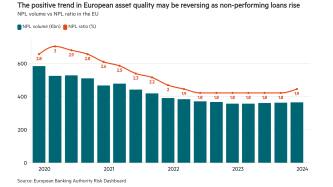The deposit flight from Greek banks began two months before the Greek presidential election, which took place on January 25. According to the Bank of Greece, €4.6bn was withdrawn by domestic depositors in December 2014 and, according to Thomson Reuters, an estimated €11bn to €12bn left the banking system in January. This marks the single largest two-month wave of withdrawals since May 2012, when the then-newly elected government’s inability to form a coalition created similar unease among depositors.
Depending on how negotiations between Greece and the rest of the eurozone proceed, banks might also find themselves without access to European Central Bank borrowing. Admittedly, throughout the past year, Greek banks have decreased their reliance on the Greek central bank to help with liquidity, but as the deposit withdrawals picked up in December, loans by the Bank of Greece to local banks soared by €11.2bn to €56bn, the first such increase since June 2012.











